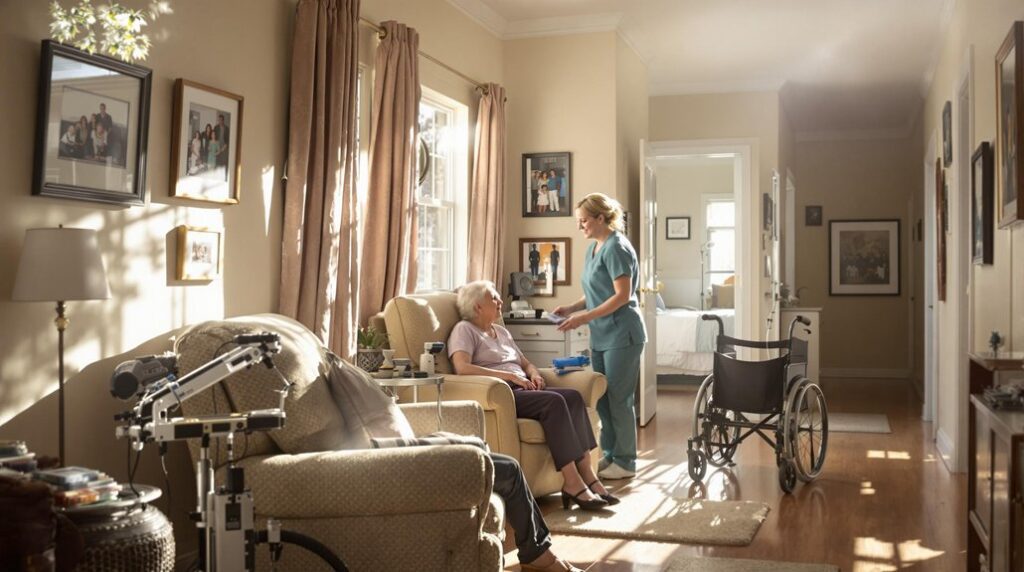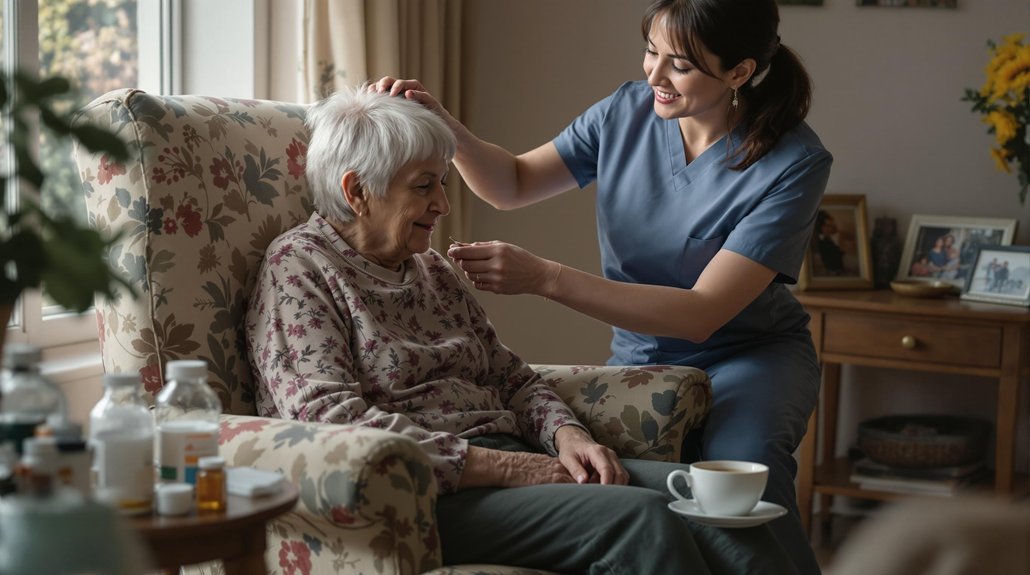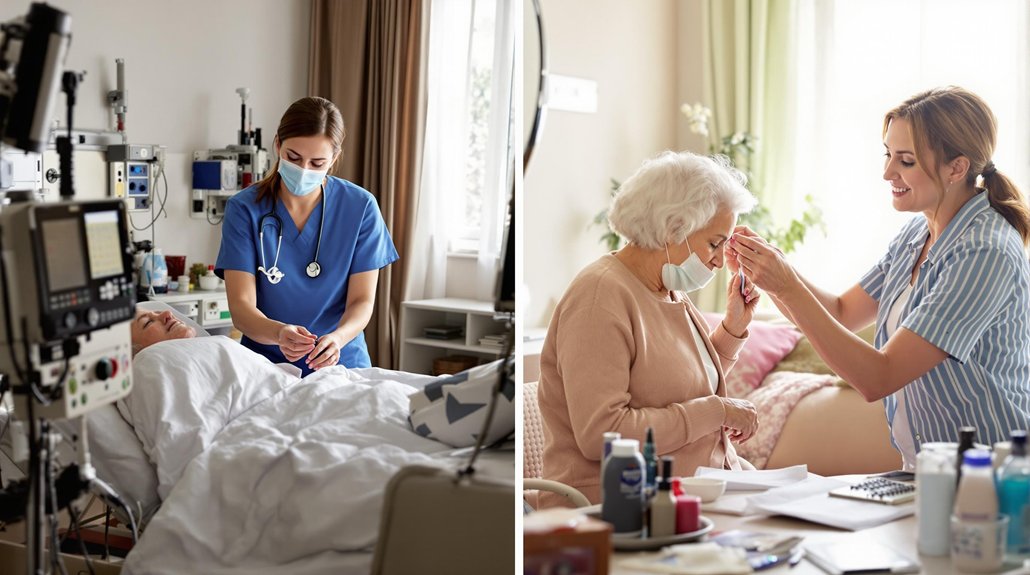A personal care home is where you’ll find 24-hour supervised care in a smaller, homelike setting for seniors or individuals needing daily assistance. You won’t receive skilled nursing care, but you’ll get help with medications, meals, housekeeping, and personal care tasks like bathing and dressing. These facilities typically house 5-20 residents and offer both private and shared rooms. Understanding the unique features of personal care homes can help you make the best choice for your situation.
Key Features and Characteristics of Personal Care Homes
Personal care homes offer supervised living environments designed for individuals who need assistance with daily activities but don’t require intensive medical care. These residential facilities maintain a home-like atmosphere while providing essential amenities and support services.
Key characteristics of personal care homes include 24-hour supervision, medication management, meal preparation, housekeeping, and assistance with personal hygiene.
Personal care homes provide round-the-clock oversight and daily living support, from managing medications to helping residents maintain their personal care routines.
You’ll find that these homes typically feature private or semi-private rooms, communal dining areas, and shared living spaces where residents can socialize.
The staff-to-resident ratio guarantees personalized attention, while maintaining residents’ dignity and independence.
Most personal care homes also coordinate transportation services, planned activities, and basic health monitoring.
They’re smaller than nursing homes, usually accommodating between 5 and 20 residents, creating a more intimate community setting.
Similar to skilled nursing services, personal care homes can provide post-operative care and recovery support to help residents maintain their independence after surgery.
Services and Support Provided in Personal Care Homes
Within these residential settings, the range of services extends far beyond basic supervision and accommodation. You’ll find dedicated staff providing personalized care tailored to each resident’s unique needs, ensuring they maintain dignity and independence. Emotional support plays an essential role, as caregivers build meaningful relationships with residents, helping them feel valued and understood. Comprehensive senior care includes specialized support for those with chronic illnesses and memory-related conditions.
| Core Services | Enhanced Support |
|---|---|
| Medication Management | Social Activities |
| Personal Hygiene Help | Transportation |
| Meal Preparation | Health Monitoring |
| Housekeeping | Therapy Sessions |
| Laundry Services | Family Coordination |
These services create a nurturing environment where residents thrive. You’ll see staff members assisting with daily activities while fostering independence, promoting social interaction, and maintaining each resident’s well-being through thorough care plans that adapt to changing needs.
Understanding Licensing and Regulation Requirements
Strict regulatory oversight governs all personal care homes to guarantee resident safety and quality care standards.
You’ll need to meet specific licensing requirements set by your state’s Department of Health and Human Services before opening your facility.
To maintain regulation compliance, you must follow protocols for staff training, medication management, emergency procedures, and facility maintenance.
Your home will undergo regular inspections to verify adherence to health and safety standards, including food service, cleanliness, and proper documentation of resident care.
You’ll also need to demonstrate financial stability, carry appropriate insurance coverage, and maintain detailed records of resident assessments and care plans.
Understanding and following these requirements isn’t just about legal obligation – it’s essential for providing quality care and protecting your residents’ well-being.
Working with medical social services can help connect you to additional resources and support for maintaining regulatory compliance.
The Difference Between Personal Care Homes and Other Facilities
Understanding the distinctions between care facilities is essential when planning your business. Personal care homes differ from other residential care options in several key ways, primarily in their size and scope of services.
While assisted living facilities often accommodate larger numbers of residents in apartment-style settings, personal care homes typically serve fewer individuals in a more intimate, home-like environment.
- Personal care homes provide basic assistance with daily activities while promoting independence in a family-style setting.
- Independent living communities cater to active seniors who don’t need regular assistance.
- Assisted living facilities offer more extensive medical care and structured activities.
- Personal care homes bridge the gap between independent living and assisted living, offering personalized attention in a smaller, more manageable environment.
You’ll need to take into account these differences when determining which type of facility best aligns with your caregiving goals. Skilled nursing care is typically not provided in personal care homes, making them distinct from comprehensive home health care agencies that offer medical services.
Choosing the Right Personal Care Home for Your Loved One
Selecting a personal care home for your loved one can feel overwhelming, but breaking down the decision into manageable steps makes the process easier.
Start by researching facilities that match your loved one’s personal preferences and care requirements. Consider location, cost, available activities, and medical support. Schedule visits to your top choices during different times of day to observe staff interactions and resident engagement.
Pay attention to cleanliness, safety measures, and the overall atmosphere. Ask about family involvement policies, visiting hours, and how the facility communicates with relatives. Review state inspection reports and licensing credentials.
Don’t hesitate to talk with current residents and their families about their experiences. Trust your instincts – if something doesn’t feel right, continue your search until you find a place where you’re confident your loved one will thrive.
Many families choose to explore private in-home care as an alternative option that allows seniors to receive personalized attention while remaining in familiar surroundings.
Cost Considerations and Payment Options
The costs of personal care homes vary considerably based on location, services, and amenities.
You’ll find that monthly rates typically cover room and board, basic care services, and daily assistance. Many facilities offer flexible payment plans to help make care more affordable for your loved one.
- Monthly costs can range from $2,000 to $6,000, depending on your geographic location and level of care needed.
- Financial assistance may be available through Medicaid waivers, veterans’ benefits, or long-term care insurance.
- Some facilities offer sliding scale fees based on your family’s income and financial situation.
- Private pay options often include using retirement savings, selling assets, or establishing a reverse mortgage.
When exploring payment options, consult with a financial advisor to determine the most suitable approach for your family’s circumstances.
Daily Life and Community Aspects in Personal Care Homes
Life in a personal care home revolves around structured daily routines while maintaining flexibility for residents’ individual preferences and needs.
You’ll find residents participating in various activities, from shared meals and social gatherings to wellness programs and recreational events. Daily routines typically include assistance with personal care, medication management, and housekeeping services.
Community engagement plays an essential role in creating a vibrant living environment.
You’ll see residents interacting during group activities, enjoying outdoor spaces, and participating in holiday celebrations. Many personal care homes also organize outings to local attractions, shopping centers, and cultural events.
Regular visits from family members are encouraged, and staff members work to create opportunities for meaningful connections between residents, fostering a supportive and engaging atmosphere where everyone feels valued and included.
Conclusion
Personal care homes play a vital role in senior care, providing a cozy, homelike environment where residents feel like family. Picture a warm, welcoming house where caregivers know each resident by name and treat them with genuine kindness. With thousands of these homes across the country helping hundreds of thousands of seniors, you have many options to choose from. Making this decision might feel overwhelming, but you don’t have to face it alone. Take time to visit different homes, ask questions, and see how residents spend their days. Watch how staff members interact with residents and notice the little touches that make it feel like home. Remember, Focus Family Care understands this journey and is here to walk beside you every step of the way. If you or a loved one need help, don’t wait. Reach out to Focus Family Care today at (561) 693-1311 or email us at info@focusfamilycare.com.




